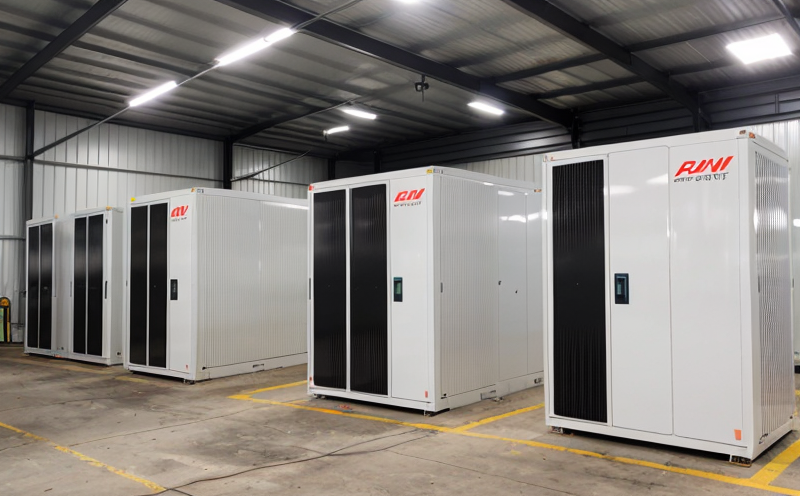IEC 62660-2 Reliability Testing of Lithium-Ion Cells for EVs
The reliability testing of lithium-ion cells for electric vehicles (EVs) is a critical component in ensuring the safety, performance, and longevity of these cells. Compliance with IEC 62660-2 standards helps manufacturers meet regulatory requirements while improving product quality. This standard focuses on assessing the mechanical and thermal stresses that lithium-ion batteries undergo during their lifecycle, including transportation, charging, and discharging.
IEC 62660-2 specifies a series of tests designed to evaluate the durability and reliability of lithium-ion cells intended for use in EVs. These tests are essential for identifying potential weaknesses that could lead to safety issues or reduced battery life. The standard covers various test methods, including static mechanical load testing, thermal cycling, and charge-discharge cycling.
Static Mechanical Load Testing: This test assesses the structural integrity of the lithium-ion cell under applied forces typical of vehicle operation. It helps determine how well the cell can withstand physical stress without compromising its performance or safety. During this test, cells are subjected to defined static loads and held at those levels for a specified duration.
Thermal Cycling: This procedure evaluates the thermal stability of lithium-ion cells by subjecting them to repeated temperature cycles between extreme temperatures (typically -20°C to +65°C). The goal is to simulate real-world conditions where batteries experience significant temperature fluctuations during charging, discharging, and in different environmental settings.
Charge-Discharge Cycling: This test measures the efficiency and capacity retention of lithium-ion cells over multiple charge-discharge cycles. By cycling the battery repeatedly under controlled conditions, engineers can assess its ability to maintain performance throughout its operational life. Efficiency is typically measured as the ratio of delivered energy during a discharge cycle relative to the input energy required for charging.
Testing these parameters involves precise specimen preparation and stringent adherence to IEC 62660-2 specifications. Specimens are carefully selected based on their intended application within EVs, ensuring that the tests accurately reflect real-world usage scenarios. Appropriate instrumentation is used throughout each test to record data points such as voltage, current, temperature, pressure, and other relevant variables.
Accurate reporting of results is crucial for interpreting the outcomes of these reliability tests correctly. Reports generated by our laboratories provide detailed insights into the performance characteristics of tested lithium-ion cells, highlighting any areas requiring improvement or further investigation. This information aids manufacturers in refining their products continuously, enhancing overall quality and safety.
Compliance with IEC 62660-2 ensures that lithium-ion cells for EVs meet stringent international standards, thereby promoting trust among consumers and regulators alike. By adhering to these rigorous testing protocols, manufacturers can demonstrate their commitment to producing reliable, high-performing batteries essential for the success of electric vehicles.
Benefits
The benefits of IEC 62660-2 reliability testing extend beyond mere compliance; they significantly enhance product quality and safety. For manufacturers, this means reduced risks associated with potential failures or recalls due to design flaws or manufacturing defects.
For consumers, reliable lithium-ion cells translate into safer driving experiences, longer-lasting batteries, and improved vehicle efficiency. These advantages contribute positively towards the adoption of electric vehicles globally, fostering a more sustainable future for transportation.
Additionally, meeting IEC 62660-2 standards can open doors to new markets and partnerships by showcasing commitment to excellence in manufacturing practices. It also helps in building brand reputation and customer confidence, which are vital factors in the competitive landscape of automotive technology.
In summary, IEC 62660-2 reliability testing serves as an essential tool for ensuring top-notch product quality while maintaining regulatory compliance. Its comprehensive approach to evaluating lithium-ion cells ensures that they perform reliably under various conditions, ultimately benefiting both producers and end-users alike.
Eurolab Advantages
At Eurolab, we pride ourselves on delivering unparalleled expertise in IEC 62660-2 reliability testing for lithium-ion cells. Our state-of-the-art facilities and experienced team provide clients with accurate, reliable test results that meet or exceed international standards.
We offer a full suite of services tailored to the unique needs of our customers, including custom testing programs designed specifically for their products. With advanced instrumentation and cutting-edge technology, we ensure precise measurements and consistent data collection across all tests.
Our commitment to quality is reflected in our ISO 9001:2015 certification, which guarantees that every aspect of our operations adheres to strict quality management principles. This ensures consistency and accuracy in all test results provided by Eurolab.
We understand the importance of timely delivery when it comes to product development cycles. That’s why we strive to complete each project efficiently without compromising on thoroughness or precision. Our experienced staff works closely with clients throughout the testing process, offering guidance where needed and ensuring full understanding of results at every stage.
By choosing Eurolab for your IEC 62660-2 reliability testing needs, you gain access to a wealth of knowledge and resources dedicated solely to helping you achieve your goals. Whether you require routine testing or need assistance with developing new products, our team is here to support you every step along the way.
Customer Impact and Satisfaction
The impact of reliable lithium-ion cells on customer satisfaction cannot be overstated. When consumers trust that their vehicles’ batteries are safe, efficient, and long-lasting, they are more likely to purchase additional products or recommend them to others.
A satisfied customer base translates into increased market share and brand loyalty for manufacturers who invest in rigorous testing processes like those outlined by IEC 62660-2. This standard not only enhances product quality but also builds a reputation as an industry leader committed to excellence.
Moreover, compliance with international standards such as this one reassures regulatory bodies that the products meet safety and performance requirements. This assurance fosters trust between governments and businesses, creating favorable conditions for both parties involved in EV manufacturing.
In conclusion, investing in IEC 62660-2 reliability testing offers numerous benefits beyond just meeting legal obligations. It enhances product quality, builds customer confidence, opens up new market opportunities, and strengthens relationships with partners and stakeholders across the entire supply chain.





